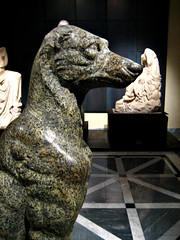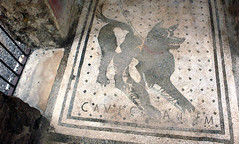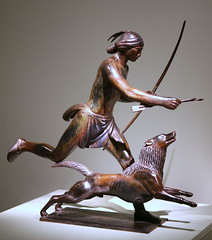 Throughout the ages dogs have always had a special bond with people. They were among the first animals that humans domesticated. Dogs have had their roles in ancient mythology, religion and cultures from Ancient Egypt to modern day pop icons. I’m a history buff, so I thought it might be interesting delve into the role that dogs played in ancient cultures and religions. Keep in mind it is by no means all-inclusive, just an outline on how dogs have been viewed by various cultures of the world.
Throughout the ages dogs have always had a special bond with people. They were among the first animals that humans domesticated. Dogs have had their roles in ancient mythology, religion and cultures from Ancient Egypt to modern day pop icons. I’m a history buff, so I thought it might be interesting delve into the role that dogs played in ancient cultures and religions. Keep in mind it is by no means all-inclusive, just an outline on how dogs have been viewed by various cultures of the world.
Dogs played a greater role in ancient religions and mythologies than they do in modern religions. Many dog references in ancient religions and cultures are related to the afterlife.  Some gods were depicted as dogs, like the Egyptian god, Anubis. Anubis was a god of the afterlife, whose job it was to guide the newly deceased into the afterlife; which we know through archeology was an important aspect of the ancient society. There is some debate on whether Anubis was a dog or a jackal, which is still in the Canis genus. However, in ancient Egypt even the family dog was revered and considered an important part of their culture. A family would mourn the loss of their family pet similarly to how we do today, as if it was the loss of a child. If they were wealthy enough they would have their pets mummified and sent into the afterlife with all their worldly possessions like their human counterparts. Many paintings and hieroglyphics have been found that include dogs in their tales of the daily lives of the ancient Egyptians, and Pharoses were even buried with their faithful dogs to continue their final journey alongside their masters.
Some gods were depicted as dogs, like the Egyptian god, Anubis. Anubis was a god of the afterlife, whose job it was to guide the newly deceased into the afterlife; which we know through archeology was an important aspect of the ancient society. There is some debate on whether Anubis was a dog or a jackal, which is still in the Canis genus. However, in ancient Egypt even the family dog was revered and considered an important part of their culture. A family would mourn the loss of their family pet similarly to how we do today, as if it was the loss of a child. If they were wealthy enough they would have their pets mummified and sent into the afterlife with all their worldly possessions like their human counterparts. Many paintings and hieroglyphics have been found that include dogs in their tales of the daily lives of the ancient Egyptians, and Pharoses were even buried with their faithful dogs to continue their final journey alongside their masters.
Dogs also played an important role in ancient Greek religion and culture. Cerberus was the three-headed dog who guarded the entrance to Hades (an early version of a guard dog perhaps?) and the gods Artemis and Hecate are often depicted with dogs. Dogs were sometimes depicted in tales as messengers. Another famous dog is found in Greek literature: Argos in The Odyssey. Argos’s tale is a sad one; he was Odysseus’s dog, who was only a puppy when Odysseus left to go war. When he returned 20 years later disguised as a beggar, Argos was the only one to recognize him. The then neglected Argos wagged his tail at Odysseus one last time and died after seeing his master return home. The ancient Greek people knew the bond that dogs and people shared was strong.
Other cultures separated by hundreds of years and miles have also noted the loyalty of dogs in their legends. The Mahabharata is an ancient Indian tale of the journey of King Yudisthira to heaven. The king starts his journey with his family members and his faithful dog by his side. By the time he reaches the gates of heaven, the dog is all that remains. The keeper of the gate tells him that he may enter, but the dog may not. Shocked that the companion that had remained so loyal to him to the end was not able to enter paradise, he refuses to enter and opts to stay on earth with his companion. The keeper of the gate tells Yudisthira that it was only a final test of his morality and admits both the dog and the king into heaven.
The ancient Romans appreciated their dogs as loyal guardians of their homes, possessions, and family members. They were often portrayed in mosaic art in the home and around public buildings. The Romans had several breeds of dog that were specialized for particular uses. They had hunting dogs, war dogs, guard dogs, and even companion animals that were allowed to stay in the house, and kept the bed warm for their ancient pet parents.
Not all ancient cultures portrayed dogs as positive creatures. Many believed that dogs, black dogs especially, were harboring evil. I find this particularly interesting because “black dog syndrome” (black dogs often being passed over for adoption due to their color) is still prevalent in modern society. In ancient India, however, people felt differently. Wild black dogs were considered to be the “hounds of god” and were sacred. It was forbidden to harm or kill one of these black dogs.

On this side of the pond, dogs were important to a few Native American tribes, particularly the Cahto tribe of California. The creator (their god) was said to have created his dog before he created the earth and the sun and the sky. This belief led them to treat their dogs with more respect and reverence than other Native American tribes. They treated them as family members, naming their pets and allowing them to sleep indoors.
The Shawnee tribe’s creation story also includes a dog. The creator’s grandson sits near the end of the world and weaves baskets. Each night his dog unravels the basket so that the world can never be finished.
There are also differing opinions about dogs among the ancient tribes of Africa. One tribe, the Dahomey, believed in a tale where a dog was granted the gift of three blessing from three gods after he helped mediate an argument. The three blessings bestowed on him made dogs the guardian of women, leader of spirits, and guide to all men.
Is it any wonder why our caning companions continue to play such deeply bedded roles in our culture? They continue to be our faithful companions in modern times. following us to war, providing search and rescue in desperate times, they help our sick, disabled, and elderly as therapy and assistance dogs. Like King Yudisthira’s faithful friend, our dogs will forever be our most faithful of friends.
Thanks for reading,
Heather
 That Pet Blog That Pet Place Pet Blog
That Pet Blog That Pet Place Pet Blog
